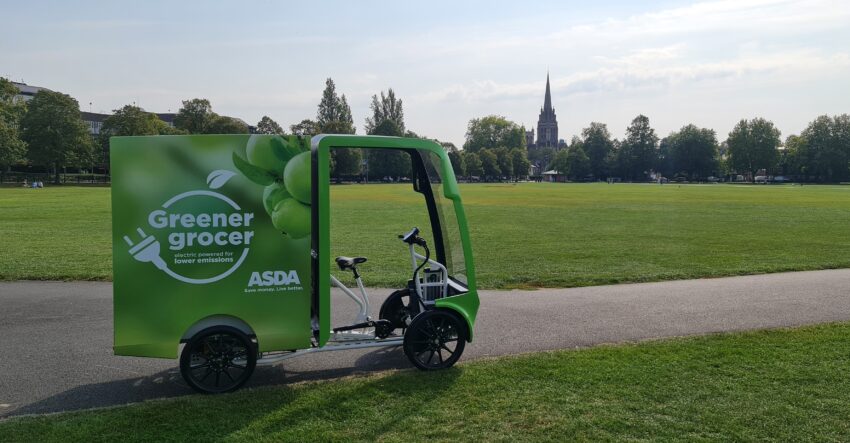Asda test sustainable grocery deliveries with micro-mobility vehicles
Electric Assisted Vehicles (EAV), the Oxfordshire-based micro-mobility manufacturer, recently had its 2Cubed commercial vehicle put to the test by Asda.
The retailer used the EAV 2Cubed vehicle over two weeks to make home deliveries in Cambridge, as part of a test conducted by Asda’s delivery team, as it focuses on a future strategy to assist in hard-to-reach urban areas.
Asda is exploring innovative solutions to assist in making deliveries in proposed pedestrianised areas and low emission zones.
Simon Gregg, Vice President of Online grocery at Asda said: “It was great to see the reaction to the e-bike when we took it out on the road – it was really well received and definitely was a talking point at the store and with our customers.
“As we look to the future of retail we have to consider new and innovative ways to continue to offer great service to our customers whilst navigating things like low emission zones and pedestrianised areas. A solution such as this would allow us to get into town and cities where access is limited, using either roads or cycle lanes.
“It’s been great to collaborate with the team at EAV and put their eCargo vehicle to the test.”
EAV’s 2Cubed ultra lightweight commercial vehicle is capable of transporting 10 tote boxes containing the equivalent of a weekly shop for 2 customers, the 2Cubed has the ability to cover up to a 60-mile delivery round more efficiently than either electric or internal combustion engine vans.
“The eCargo concept has already proven to be more efficient than any van within an urban parcels and packages logistics scenario.” Commented Adam Barmby, Founder and CEO of EAV. “Working with Asda to reduce the environmental impact of grocery, and to make those deliveries more accessible, in towns and cities has been a great test for our new 2Cubed vehicle and one we’ve been really keen to participate in.”
The 2Cubed has been designed to carry both bulk and weight while retaining its ability to move around quickly and efficiently within towns and cities. Cool temperatures can either be maintained by cool bags and insulated packaging or by using the EAV Cool fully temperature controlled Cool-Cargo transporter. Although the EAV Cool unit was not tested by Asda, this ensures that groceries reach the customer completely fresh and with no reduction in product quality.
“EAV developed a prototype EAV Cool some time ago and it’s proved very successful as a development vehicle in the tests we’ve used it for.” continued Barmby. “Moving from parcel logistics to groceries is a logical pathway for EAV and it allows us to advance our technology maintaining ambient temperatures in our cargo bays. More importantly, it hugely reduces the environmental and emissions impact of vans and cars which are currently being used by supermarket chains and other businesses within urban locations. In a post-Covid world, where home deliveries have really become the norm, the shift to lightweight commercial deliveries is vital if we want to continue our efforts in improving the environment.”
